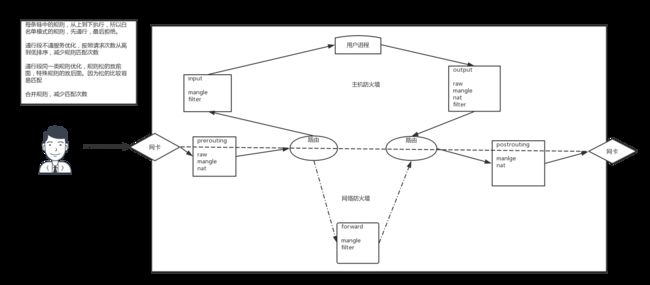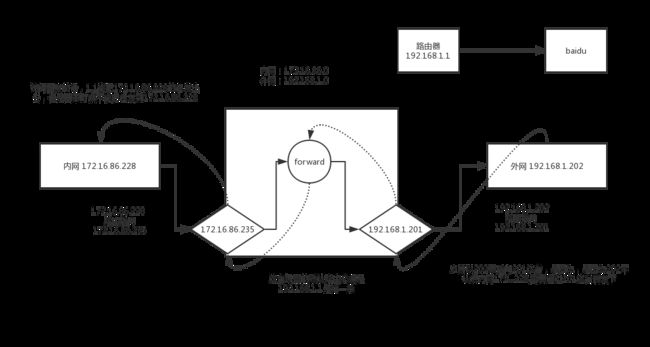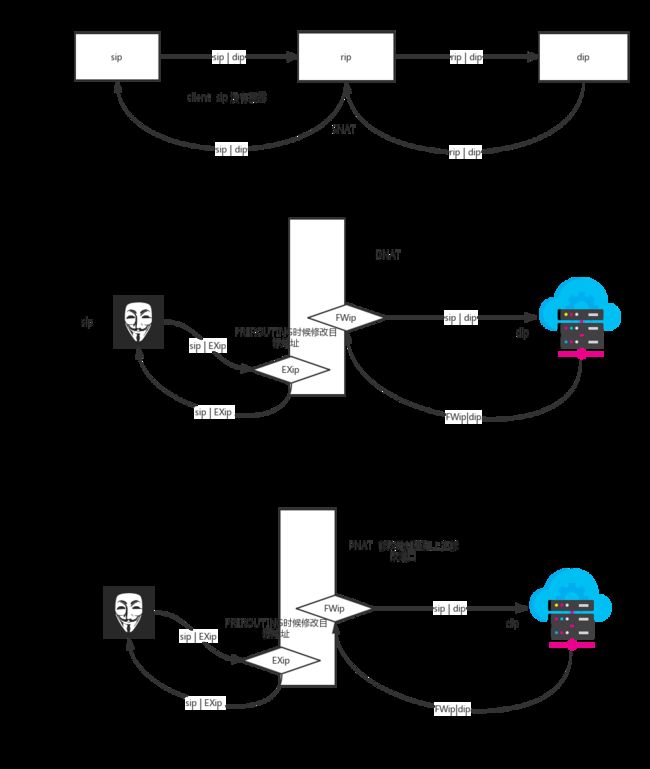Firewall:防火墙,隔离工具;工作于主机或网络边缘,对于进出本主机或本网络的报文根据事先定义的检查规则作匹配检测,对于能够被规则匹配到的报文作出相应处理的组件;
将要介绍的防火墙工具iptables,内核实现的软件防火墙,内核根据iptables的规则实现netfilter。先来看看防火墙的流程介绍。
主要由4表5链构成:
- filter:过滤,防火墙;
- nat:network address translation;用于修改源IP或目标IP,也可以改端口;
- mangle:拆解报文,做出修改,并重新封装起来;
- raw:关闭nat表上启用的连接追踪机制;
大概意思就是:在每条链上添加上述4表的规则,来实现报文过滤转发等功能。
主机防火墙介绍
上图的上部分就是主机防火墙的工作流程。
1、常用操作
#查看
[root@node3 ~]# iptables -vnL [--line-numbers] # v vv vvv
#清空数据
[root@node3 ~]# iptables -Z [chain]
#删除 规则
[root@node3 ~]# iptables -D chain num
#清空所有规则
[root@node3 ~]# iptables -F [chain]
#创建删除自定义chain 不能删除被正在被引用的chain
[root@localhost ~]# iptables -N in_web_rule
[root@localhost ~]# iptables -t in_web_rule
[root@localhost ~]# iptables -X in_web_rule 1.1 初始化 开放ssh,设置白名单
[root@node3 ~]# iptables -I INPUT -p tcp --dport 22 -j ACCEPT
[root@node3 ~]# iptables -I OUTPUT -p tcp --sport 22 -j ACCEPT
[root@node3 ~]# iptables -P FORWARD DROP
[root@node3 ~]# iptables -A INPUT -j REJECT
[root@node3 ~]# iptables -A OUTPUT -j REJECT
或者修改策略 还是前者比较好,或者会屏蔽 本地回环地址,还要其他操作开通
[root@node3 ~]# iptables -P INPUT DROP
[root@node3 ~]# iptables -P OUTPUT DROP
1.2 非状态规则添加
80服务器
[root@node3 ~]# iptables -I INPUT -p tcp --dport 80 -j ACCEPT
[root@node3 ~]# iptables -I OUTPUT -p tcp --sport 80 -j ACCEPT
[root@node2 ~]# curl http://192.168.1.202
It works!
#正式环境不要用,测试环境需要安装yum之类
[root@node3 ~]# iptables -I INPUT -p tcp --sport 80 -j ACCEPT
[root@node3 ~]# iptables -I OUTPUT -p tcp --dport 80 -j ACCEPT443服务器
[root@node3 ~]# iptables -I INPUT -p tcp --dport 443 -j ACCEPT
[root@node3 ~]# iptables -I OUTPUT -p tcp --sport 443 -j ACCEPT
#正式环境不要用,测试环境需要安装yum之类
[root@node3 ~]# iptables -I INPUT -p tcp --sport 443 -j ACCEPT
[root@node3 ~]# iptables -I OUTPUT -p tcp --dport 443 -j ACCEPTdns
#域名解析 一般也不用开放 测试环境需要安装yum之类
[root@node3 ~]# iptables -I OUTPUT -p udp --dport 53 -j ACCEPT
[root@node3 ~]# iptables -I INPUT -p udp --sport 53 -j ACCEPT
[root@node3 ~]# ping baidu.com
PING baidu.com (123.125.115.110) 56(84) bytes of data.
64 bytes from 123.125.115.110 (123.125.115.110): icmp_seq=1 ttl=51 time=37.1 ms
#dns服务器
[root@node3 ~]# iptables -I OUTPUT -p tcp --dport 53 -j ACCEPT
[root@node3 ~]# iptables -I INPUT -p tcp --sport 53 -j ACCEPTping
#往外ping
[root@node3 ~]# iptables -I INPUT -i ens34 -p icmp --icmp-type 0 -j ACCEPT
[root@node3 ~]# iptables -I OUTPUT -o ens34 -p icmp --icmp-type 8 -j ACCEPT
#被ping
[root@node3 ~]# iptables -I INPUT -i ens34 -p icmp --icmp-type 8 -j ACCEPT
[root@node3 ~]# iptables -I OUTPUT -o ens34 -p icmp --icmp-type 0 -j ACCEPTftp
#[root@localhost ~]# modinfo nf_conntrack_ftp
#[root@localhost ~]# lsmod |grep nf_conntrack_ftp
[root@localhost ~]# modprobe nf_conntrack_ftp #装载
#[root@localhost ~]# modprobe -r nf_conntrack_ftp #卸载
[root@node3 ~]# iptables -I INPUT -p tcp -m multiport --dports 21 -m state --state NEW -j ACCEPT
[root@node3 ~]# iptables -I INPUT -m state --state ESTABLISHED,RELATED -j ACCEPT
[root@node3 ~]# iptables -I OUTPUT -m state --state ESTABLISHED -j ACCEPTntpdate
#请求
[root@node3 ~]# iptables -I OUTPUT -p udp -m multiport --dports 123,323 -j ACCEPT
[root@node3 ~]# iptables -I INPUT -p udp -m multiport --sports 123,323 -j ACCEPTsamba
[root@node3 ~]# iptables -I INPUT -p udp -m multiport --dports 137,138 -j ACCEPT
[root@node3 ~]# iptables -I OUTPUT -p udp -m multiport --sports 137,138 -j ACCEPT
[root@node3 ~]# iptables -I INPUT -p tcp -m multiport --dports 139,445 -j ACCEPT
[root@node3 ~]# iptables -I OUTPUT -m state --state ESTABLISHED -j ACCEPT根据ip控制并发
##最大一次5个,每分钟20个,被ping 配合--syn使用
[root@localhost ~]# iptables -I INPUT -p icmp --icmp-type 8 -m limit --limit-burst 5 --limit 20/minute -j ACCEPT
[root@localhost ~]# iptables -I OUTPUT -p icmp --icmp-type 0 -j ACCEPT2 用状态方式控制
[root@localhost ~]# cat /proc/sys/net/nf_conntrack_max
65536
[root@localhost ~]# vim /etc/sysctl.conf
#net.nf_conntrack_max = 2097152
net.netfilter.nf_conntrack_tcp_timeout_established = 300
net.netfilter.nf_conntrack_max = 1048576 #最大状态连接数
net.netfilter.nf_conntrack_tcp_timeout_close_wait = 60
net.netfilter.nf_conntrack_tcp_timeout_fin_wait = 120
net.netfilter.nf_conntrack_tcp_timeout_time_wait = 120
net.ipv4.conf.default.forwarding = 1
[root@localhost ~]# sysctl -p[root@node3 ~]# iptables -A INPUT -m state --state ESTABLISHED -j ACCEPT
[root@node3 ~]# iptables -A OUTPUT -m state --state ESTABLISHED -j ACCEPT
#tcp 端口
[root@node3 ~]# iptables -A INPUT -p tcp -m multiport --dports 22,80,443 -m state --state NEW -j ACCEPT
#udp 端口
#[root@node3 ~]# iptables -A INPUT -p dup -m multiport --dports 22,80,443 -m state --state NEW -j ACCEPT
[root@node3 ~]# iptables -A INPUT -j REJECT
[root@node3 ~]# iptables -A OUTPUT -j REJECT
[root@node3 ~]# iptables -vnL
#如果需要解析yum
[root@node3 ~]# iptables -I OUTPUT -p udp -m multiport --dports 53 -m state --state NEW -j ACCEPT
[root@node3 ~]# iptables -I OUTPUT -p tcp -m multiport --dports 80,443 -m state --state NEW -j ACCEPTpython脚本生成规则
#!/root/.virtualenvs/shellenv/bin/python
import os
class generate:
interface = False
ip = False
name = ''
ssh_port = 22
#21 or False
ftp_port = False
# for server response
tcp_in_ports = [80]
udp_in_ports = []
# for server request
out_put_enable = False
tcp_out_ports = []
udp_out_ports = []
ping_in = False
ping_out = False
first_custom_rules = []
middle_custom_rules = []
last_custom_rules = []
EOL='\n'
def __init__(self, config_name):
import yaml
self.name = config_name
file_path = 'conf/host-{name}.yaml'.format(name=config_name)
if not os.path.isfile(file_path):
print('no config')
exit(1)
config = yaml.load(open(file_path))
if config.get('ssh_port') : self.ssh_port = config.get('ssh_port')
if config.get('ftp_port') : self.ftp_port = config.get('ftp_port')
if config.get('tcp_in_ports') : self.tcp_in_ports = config.get('tcp_in_ports')
if config.get('udp_in_ports') : self.udp_in_ports = config.get('udp_in_ports')
if config.get('out_put_enable') : self.out_put_enable = config.get('out_put_enable')
if config.get('tcp_out_ports') : self.tcp_out_ports = config.get('tcp_out_ports')
if config.get('udp_out_ports') : self.udp_out_ports = config.get('udp_out_ports')
if config.get('ping_in') : self.ping_in = config.get('ping_in')
if config.get('ping_out') : self.ping_out = config.get('ping_out')
if config.get('ip') : self.ip = config.get('ip')
if config.get('interface') : self.interface = config.get('interface')
if config.get('first_custom_rules') : self.first_custom_rules = config.get('first_custom_rules')
if config.get('middle_custom_rules') : self.middle_custom_rules = config.get('middle_custom_rules')
if config.get('last_custom_rules') : self.last_custom_rules = config.get('last_custom_rules')
self.dip = ''
self.sip = ''
if self.ip:
self.dip = ' -d '+self.ip
self.sip = ' -s '+self.ip
self.iinterface = ''
self.ointerface = ''
if self.interface:
self.iinterface = ' -i '+self.interface
self.ointerface = ' -o ' + self.interface
def start(self):
rules = self.initHostRules()
if self.first_custom_rules:
rules += self.customRules(self.first_custom_rules)
rules += self.established()
if self.ftp_port:
rules += self.enableFtp()
self.tcp_in_ports.append(self.ftp_port)
if self.tcp_in_ports:
rules += self.tcpInRules()
if self.udp_in_ports:
rules += self.udpInRules()
if self.middle_custom_rules:
rules += self.customRules(self.middle_custom_rules)
if self.out_put_enable:
if self.tcp_out_ports:
rules += self.tcpOutRules()
if self.udp_out_ports:
rules += self.udpOutRules()
if self.ping_out:
rules += self.pingOut()
if self.ping_in:
rules += self.pingIn()
if self.last_custom_rules:
rules += self.customRules(self.last_custom_rules)
rules += self.sshRules()
rules += self.rejectRules()
self.write(rules)
pass
def customRules(self,data):
rules = ''
for rule in data:
rules += rule+self.EOL
return rules
def tcpInRules(self):
ports = self.__map_num_2_str(self.tcp_in_ports)
ports = ','.join(ports)
rules = 'iptables -A INPUT {ip} {interface} -p tcp -m multiport --dports {ports} -m state --state NEW -j ACCEPT'.format(ports=ports,ip=self.dip, interface=self.iinterface)+self.EOL+self.EOL
return rules
def udpInRules(self):
ports = self.__map_num_2_str(self.udp_in_ports)
ports = ','.join(ports)
rules = 'iptables -A INPUT {ip} {interface} -p udp -m multiport --dports {ports} -m state --state NEW -j ACCEPT'.format(ports=ports, ip=self.dip, interface=self.iinterface)+self.EOL+self.EOL
return rules
def tcpOutRules(self):
ports = self.__map_num_2_str(self.tcp_out_ports)
ports = ','.join(ports)
rules = 'iptables -A OUTPUT {ip} {interface} -p tcp -m multiport --dports {ports} -m state --state NEW -j ACCEPT'.format(
ports=ports, ip=self.sip, interface=self.ointerface) + self.EOL + self.EOL
return rules
def udpOutRules(self):
ports = self.__map_num_2_str(self.udp_out_ports)
ports = ','.join(ports)
rules = 'iptables -A OUTPUT {ip} {interface} -p udp -m multiport --dports {ports} -m state --state NEW -j ACCEPT'.format(
ports=ports, ip=self.sip, interface=self.ointerface) + self.EOL + self.EOL
return rules
def enableFtp(self):
return 'modprobe nf_conntrack_ftp'+ self.EOL
def pingOut(self):
return 'iptables -A OUTPUT {ip} {interface} -p icmp --icmp-type 0 -j ACCEPT'.format(ip=self.sip, interface=self.ointerface) + self.EOL
def pingIn(self):
return 'iptables -A INPUT {ip} {interface} -p icmp --icmp-type 8 -j ACCEPT'.format(ip=self.dip, interface=self.iinterface) + self.EOL
def established(self):
RELATED=''
if self.ftp_port:
RELATED = ',RELATED'
rules = 'iptables -A INPUT -m state --state ESTABLISHED{RELATED} -j ACCEPT'.format(RELATED=RELATED) + self.EOL
rules += 'iptables -A OUTPUT -m state --state ESTABLISHED -j ACCEPT' + self.EOL + self.EOL
return rules
def initHostRules(self):
rules = 'iptables -P FORWARD DROP'+self.EOL
rules += 'iptables -P INPUT ACCEPT'+self.EOL
rules += 'iptables -P OUTPUT ACCEPT'+self.EOL
rules += 'iptables -F'+self.EOL+self.EOL
return rules
def sshRules(self):
if not self.ssh_port:
exit('need ssh_port')
print('ssh port {port}'.format(port=self.ssh_port))
rules = 'iptables -A INPUT -p tcp --dport {port} -j ACCEPT'.format(port=self.ssh_port)+self.EOL
rules += 'iptables -A OUTPUT -p tcp --sport {port} -j ACCEPT'.format(port=self.ssh_port)+self.EOL+self.EOL
return rules
def rejectRules(self):
rules = 'iptables -A INPUT -j REJECT'+self.EOL
rules += 'iptables -A OUTPUT -j REJECT'+self.EOL
return rules
def write(self, data):
data = '#!/bin/bash'+self.EOL+self.EOL + data
with open('shell/host-{name}.sh'.format(name=self.name),mode='w', encoding='utf-8') as f:
f.write(data)
def __map_num_2_str(self,data):
return map(lambda x: str(x), data)
if __name__ == '__main__':
# pydepends = ['pyyaml']
# for i in pydepends:
# os.system('/root/.virtualenvs/shellenv/bin/pip install requests -i http://pypi.douban.com/simple/ --trusted-host pypi.douban.com '+i)
iptables = generate('develop')
iptables.start()配置文件在conf下面 host-{name}.yaml 根据各种场景生成rules
ip: 192.168.1.202
interface: ens34
ssh_port: 22
ftp_port: 21
tcp_in_ports: [80, 443,139,445]
udp_in_ports: [80, 443,137,138]
out_put_enable: True
tcp_out_ports: [80, 443]
udp_out_ports: [53,123,323]
ping_in: True
ping_out: True
#单个ip并发
first_custom_rules :
- iptables -A INPUT -p tcp --dport 80 -m connlimit --connlimit-above 50 -j REJECT生成脚本在shell目录下
#!/bin/bash
iptables -P FORWARD DROP
iptables -P INPUT ACCEPT
iptables -P OUTPUT ACCEPT
iptables -F
iptables -A INPUT -p tcp --dport 80 -m connlimit --connlimit-above 50 -j REJECT
iptables -A INPUT -m state --state ESTABLISHED,RELATED -j ACCEPT
iptables -A OUTPUT -m state --state ESTABLISHED -j ACCEPT
modprobe nf_conntrack_ftp
iptables -A INPUT -d 192.168.1.202 -i ens34 -p tcp -m multiport --dports 80,443,139,445,21 -m state --state NEW -j ACCEPT
iptables -A INPUT -d 192.168.1.202 -i ens34 -p udp -m multiport --dports 80,443,137,138 -m state --state NEW -j ACCEPT
iptables -A OUTPUT -s 192.168.1.202 -o ens34 -p tcp -m multiport --dports 80,443 -m state --state NEW -j ACCEPT
iptables -A OUTPUT -s 192.168.1.202 -o ens34 -p udp -m multiport --dports 53,123,323 -m state --state NEW -j ACCEPT
iptables -A OUTPUT -s 192.168.1.202 -o ens34 -p icmp --icmp-type 0 -j ACCEPT
iptables -A INPUT -d 192.168.1.202 -i ens34 -p icmp --icmp-type 8 -j ACCEPT
iptables -A INPUT -p tcp --dport 22 -j ACCEPT
iptables -A OUTPUT -p tcp --sport 22 -j ACCEPT
iptables -A INPUT -j REJECT
iptables -A OUTPUT -j REJECT
网络防火墙介绍
实验环境
node1 172.16.86.228
node2 forward
node3 192.168.1.202在没有规则下,先观察ping
[root@node2 ~]# echo 1 > /proc/sys/net/ipv4/ip_forward
[root@node2 ~]# iptables -vnL
Chain FORWARD (policy ACCEPT 0 packets, 0 bytes)
pkts bytes target prot opt in out source destination#node3 访问 node1 http
[root@node3 ~]# ping 172.16.86.228
#如果不通 抓包
[root@node1 ~]# tcpdump -i any -nn icmp
tcpdump: verbose output suppressed, use -v or -vv for full protocol decode
listening on any, link-type LINUX_SLL (Linux cooked), capture size 262144 bytes
17:11:38.783442 IP 192.168.1.202 > 172.16.86.228: ICMP echo request, id 6528, seq 13, length 64 node1收到来自node3的包
17:11:38.783492 IP 172.16.86.228 > 192.168.1.202: ICMP echo reply, id 6528, seq 13, length 64 node1响应给node3
[root@node2 ~]# tcpdump -i any -nn icmp
tcpdump: verbose output suppressed, use -v or -vv for full protocol decode
listening on any, link-type LINUX_SLL (Linux cooked), capture size 262144 bytes
17:12:16.883705 IP 192.168.1.202 > 172.16.86.228: ICMP echo request, id 6528, seq 51, length 64 node3 请求 node1
17:12:16.884212 IP 172.16.86.228 > 192.168.1.202: ICMP echo reply, id 6528, seq 51, length 64 node1响应node3
从这个过程分析得到 无论是哪个网卡接近来的包,出去时候会自动选择一个能到达对面的网卡, 转发过程不会改变原地址和目标地址添加规则
[root@node2 ~]# iptables -A FORWARD -j REJECT通用规则
[root@node2 ~]# iptables -I FORWARD -m state --state ESTABLISHED -j ACCEPT放ping
[root@node2 ~]# iptables -I FORWARD -p icmp --icmp-type 8 -j ACCEPTtcp
[root@node2 ~]# iptables -I FORWARD -p tcp -m multiport --dports 80,443,139,445 -m state --state NEW -j ACCEPTudp
[root@node2 ~]# iptables -I FORWARD -p udp -m multiport --dports 53 -m state --state NEW -j ACCEPTftp
[root@node2 ~]# modprobe nf_conntrack_ftp #装载
[root@node2 ~]# iptables -I FORWARD -m state --state ESTABLISHED,RELATED -j ACCEPT
[root@node2 ~]# iptables -I FORWARD -p tcp -m multiport --dports 21 -m state --state NEW -j ACCEPTpython脚本生成
#!/root/.virtualenvs/shellenv/bin/python
import os
class generate:
interface = False
ip = False
name = ''
ssh_port = 22
#21 or False
ftp_port = False
# for server response
tcp_in_ports = [80]
udp_in_ports = []
ping = False
first_custom_rules = []
middle_custom_rules = []
last_custom_rules = []
EOL='\n'
def __init__(self, config_name):
import yaml
self.name = config_name
file_path = 'conf/forward-{name}.yaml'.format(name=config_name)
if not os.path.isfile(file_path):
print('no config')
exit(1)
config = yaml.load(open(file_path))
if config.get('ssh_port') : self.ssh_port = config.get('ssh_port')
if config.get('ftp_port') : self.ftp_port = config.get('ftp_port')
if config.get('tcp_in_ports') : self.tcp_in_ports = config.get('tcp_in_ports')
if config.get('udp_in_ports') : self.udp_in_ports = config.get('udp_in_ports')
if config.get('out_put_enable') : self.out_put_enable = config.get('out_put_enable')
if config.get('tcp_out_ports') : self.tcp_out_ports = config.get('tcp_out_ports')
if config.get('udp_out_ports') : self.udp_out_ports = config.get('udp_out_ports')
if config.get('ping_in') : self.ping_in = config.get('ping_in')
if config.get('ping_out') : self.ping_out = config.get('ping_out')
if config.get('first_custom_rules') : self.first_custom_rules = config.get('first_custom_rules')
if config.get('middle_custom_rules') : self.middle_custom_rules = config.get('middle_custom_rules')
if config.get('last_custom_rules') : self.last_custom_rules = config.get('last_custom_rules')
def start(self):
rules = self.initForwardRules()
if self.first_custom_rules:
rules += self.customRules(self.first_custom_rules)
rules += self.established()
if self.ftp_port:
rules += self.enableFtp()
self.tcp_in_ports.append(self.ftp_port)
if self.tcp_in_ports:
rules += self.tcpInRules()
if self.udp_in_ports:
rules += self.udpInRules()
if self.middle_custom_rules:
rules += self.customRules(self.middle_custom_rules)
if self.ping:
rules += self.doPing()
if self.last_custom_rules:
rules += self.customRules(self.last_custom_rules)
rules += self.sshRules()
rules += self.rejectRules()
self.write(rules)
def customRules(self,data):
rules = ''
for rule in data:
rules += rule+self.EOL
return rules
def tcpInRules(self):
ports = self.__map_num_2_str(self.tcp_in_ports)
ports = ','.join(ports)
rules = 'iptables -A FORWARD -p tcp -m multiport --dports {ports} -m state --state NEW -j ACCEPT'.format(ports=ports)+self.EOL+self.EOL
return rules
def udpInRules(self):
ports = self.__map_num_2_str(self.udp_in_ports)
ports = ','.join(ports)
rules = 'iptables -A FORWARD -p udp -m multiport --dports {ports} -m state --state NEW -j ACCEPT'.format(ports=ports)+self.EOL+self.EOL
return rules
def enableFtp(self):
return 'modprobe nf_conntrack_ftp'+ self.EOL
def doPing(self):
return 'iptables -A FORWARD -p icmp --icmp-type 8 -j ACCEPT' + self.EOL
def established(self):
rules = 'iptables -A FORWARD -m state --state ESTABLISHED -j ACCEPT' + self.EOL + self.EOL
return rules
def initForwardRules(self):
rules = 'iptables -P FORWARD ACCEPT'+self.EOL
rules += 'iptables -P INPUT ACCEPT'+self.EOL
rules += 'iptables -P OUTPUT ACCEPT'+self.EOL
rules += 'iptables -F'+self.EOL+self.EOL
return rules
def sshRules(self):
if not self.ssh_port:
exit('need ssh_port')
print('ssh port {port}'.format(port=self.ssh_port))
rules = 'iptables -A INPUT -p tcp --dport {port} -j ACCEPT'.format(port=self.ssh_port)+self.EOL
rules += 'iptables -A OUTPUT -p tcp --sport {port} -j ACCEPT'.format(port=self.ssh_port)+self.EOL+self.EOL
return rules
def rejectRules(self):
rules = 'iptables -A INPUT -j REJECT'+self.EOL
rules += 'iptables -A OUTPUT -j REJECT'+self.EOL
return rules
def write(self, data):
data = '#!/bin/bash'+self.EOL+self.EOL + data
with open('shell/forward-{name}.sh'.format(name=self.name),mode='w', encoding='utf-8') as f:
f.write(data)
def __map_num_2_str(self,data):
return map(lambda x: str(x), data)
if __name__ == '__main__':
# pydepends = ['pyyaml']
# for i in pydepends:
# os.system('/root/.virtualenvs/shellenv/bin/pip install requests -i http://pypi.douban.com/simple/ --trusted-host pypi.douban.com '+i)
iptables = generate('develop')
iptables.start()配置文件 conf/forward-develop.yaml
ip: False
interface: False
ssh_port: 22
ftp_port: 21
tcp_in_ports: [80, 443,139,445]
udp_in_ports: [80, 443,137,138]
ping: True
#单个ip并发
first_custom_rules :
- iptables -A FORWARD -p tcp --dport 80 -m connlimit --connlimit-above 50 -j REJECTnat dnat介绍
#在报文离开当前网卡前POSTROUTING转换源地址ip
[root@node2 ~]# iptables -t nat -A POSTROUTING -s 172.16.86.0/24 -j SNAT --to-source 192.168.1.201dnat
#在报文进入网卡时候在PREROUTING改变目标地址
[root@node2 ~]# iptables -t nat -I PREROUTING -d 192.168.1.201 -p tcp --dport 80 -j DNAT --to-destination 172.16.86.228
[root@node3 ~]# curl http://192.168.1.201
It works!
#在报文进入网卡时候在PREROUTING改变目标地址和端口
[root@node3 ~]# curl http://192.168.1.201
curl: (7) Failed connect to 192.168.1.201:80; Connection refused
[root@node2 ~]# iptables -t nat -R PREROUTING 1 -d 192.168.1.201 -p tcp --dport 80 -j DNAT --to-destination 172.16.86.228:8080
[root@node3 ~]# curl http://192.168.1.201
It works!
端口映射
作用于当前机器,以下例子把80映射到8080端口
[root@node1 ~]# iptables -t nat -A PREROUTING -d 172.16.86.228 -p tcp --dport 80 -j REDIRECT --to-ports 8080


